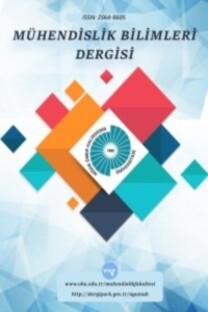Mikrodalga’da kurutulan sarımsağın (Allium sativum L.) rehidrasyon oranı, renk değerleri ve kurutma kinetiğinin incelenmesi
kurutma, sarımsak, mikrodalga, modelleme, nonliner analiz
Examination of rehydration ratio, color properties and drying kinetics of microwave dried garlic (Allium sativum L.)
drying, garlic, microwave, modelling, nonlinear analyses,
___
- M. Younis, D. Abdelkarim, and A. El-Abdein, Kinetics and mathematical modeling of infrared thin-layer drying of garlic slices. Saudi Journal of Biological Sciences, 25, 332–338, 2018. http://dx.doi.org/10.1016/j.sjbs.2017. 06.011.
- C. Condurso, F. Cinnotta, G. Tripodi, M. Merlino, and A. Verzera, Influence of drying technologies on the aroma of Sicilian red garlic. LWT - Food Science and Technology, 104, 180–185, 2019. https://doi.org/ 10.1016/j.lwt.2019.01.026.
- Y. Feng, C. Zhou, A. Yagoub, Sun, Y. Sun, P. Owusu-Ansah, X. Yu, X. Wang, X. Xu, J. Zhang, and Z. Ren, Improvement of the catalytic infrared drying process and quality characteristics of the dried garlic slices by ultrasound-assisted alcohol pretreatment. LWT - Food Science and Technology, 116, 108577, 2019. https://doi.org/10.1016/j.lwt.2019.108577.
- C. Zhou, Y. Feng, L Zhang., A. Yagoub, H.Wahia, H. Ma, Y. Sun, and X. Yu, Rehydration characteristics of vacuum freeze- and hot air-dried garlic slices. LWT - Food Science and Technology, 143, 111158, 2021. https://doi.org/10.1016/j.lwt.2021.111158.
- Y. Ling, Q. Li, H. Zheng, M. Omran, L. Gao, K. Li and G. Chen, Drying kinetics and microstructure evolution of nano-zirconia under microwave pretreatment. Ceramics International, 47, 22530–22539, 2021. https://doi.org/ 10.1016/j.ceramint.2021.04.263.
- L. Shen, Y. Zhu, C. Liu, L. Wang, H. Liu, M. Kamruzzaman, C. Liu, Y. Zhang and Zheng, X. Zheng, Modelling of moving drying process and analysis of drying characteristics for germinated brown rice under continuous microwave drying. Biosystem Engineering, 195, 64-88, 2020. https://doi.org/10.1016/ j.biosystemseng.2020.05.002.
- A. Moreno, A. J. Aguirre, R. H. Maqueda, G. Jimenez, and C.T. Mino, Effect of temperature on the microwave drying process and the viability of amaranth seeds. Biosystem Engineering, 215, 49-66, 2022. https://doi.org/10.1016/j.biosystemseng.2021.12.019.
- G. R. Carvalho, R. L. Monteiro, J. B. Laurindo and P. Auugusto, Microwave and microwave-vacuum drying as alternatives to convective drying in barley malt processing. Innovative Food Science and Emerging Technologies, 73, 102770, 2021. https://doi.org/ 10.1016/j.ifset.2021.102770.
- W. K. Lewis, The rate of drying of solid materials. Industrial & Engineering Chemistry, 13(5), 427-432, 1921.
- G. E. Page, Factors influencing the maximum rate of air drying shelled corn in thin-layers. MSc Thesis, Purdue University, West Lafayette, 1949.
- S. M. Henderson, and. Pabis, Grain drying theory I: Temperature effect on drying coefficient. Journal of Agricultural Engineering Research, 6, 169-174, 1961.
- A. Midilli, H. Küçük, and Z. Yapar, A new model for single-layer drying. drying technology, 20, 1503-1513, 2002.
- İ. Doymaz, Drying of eggplant slices in thin layers at different air temperatures. Journal of Food Process Preservation, 35, 280-289, 2011. http://doi:10.1111/ j.1745-4549.2009.00454.x.
- İ. Doymaz, and O. Ismail, Experimental characterization and modelling of drying of pear slices. Food Science and Biotechnology, 21(5), 1377–1381, 2012. https://10.1007/ s10068-012-0181-3.
- E. S. Kırmızıkaya, İ. Çınar, Halojen isıtıcılı kurutucuda kurutma sıcaklığının beyaz şapkalı mantarının (agaricus bisporus) kuruma süresi ve rehidrasyon oranına etkisi. MANTAR DERGİSİ/The Journal of Fungus, 172- 179, 2019. https://10.30708.mantar.639359.
- G. İzli, Farklı kurutma uygulamalarının armut meyvesinin bazı kalite özellikleri üzerine etkileri. Türk Tarım-Gıda Bilimi Teknolojisi Dergisi, 6(4): 479-485, 2018. https://doi.org/10.24925/turjaf.v6i4.479-485.1800.
- S. Günaydın, Mikrodalga, konvektif ve gölgede kurutma yöntemleri kullanilarak kurutulmuş kuşburnu meyvesinin kurutma kinetiği, renk ve besin elementi içeriği açisindan incelenmesi, Yüksek Lisans Tezi, Bursa Uludağ Üniveristesi, Türkiye, 2020.
- A. Özkan-Karabacak, Farkli yöntemlerle kurutulan havuç pestillerinin kurutma karakteristikleri ile bazi kalite parametrelerindeki değişimin modellenmesi ve in vitro biyoyararliliklarinin belirlenmesi, Doktora Tezi, Bursa Uludağ Üniveristesi, Türkiye, 2021.
- Ç. Hanmammadli , Mikrodalga yöntemiyle bazi mantar çeşitlerinin kurutulmasinda kurutma parametrelerinin belirlenmesi, Yüksek Lisans Tezi, Bursa Uludağ Üniversitesi, Türkiye, 2020.
- İ. Doymaz, and C. Aktaş, Determination of drying and rehydration characteristics of eggplant slices. Journal of the Faculty of Engineering and Architecture of Gazi University, 33(3), 833-841, 2018. https://10.17341/ gazimmfd.416386.
- N. Kutlu, A İşçi., and Ö. Demirkol-Şakıyan , Gıdalarda ince tabaka kurutma modelleri. GIDA, 40(1): p. 39-46, 2015. https://10.15237/gida.GD14031.
- I. İlter , S. Akyıl, E. Devseren, D. Okut, M. Koç, and F. Kaymak-Ertekin, Microwave and hot air drying of garlic puree: drying kinetics and quality characteristics. Heat and Mass Transfer, 54, 2101–2112, 2018. https://doi.org/10.1007/s00231-018-2294-6.
- ISSN: 2564-6605
- Yayın Aralığı: 4
- Başlangıç: 2017
- Yayıncı: Niğde Ömer Halisdemir Üniversitesi
Kuzey Makedonya kadastro sisteminin gelişimi: Kadastro sistemine genel bakış
Edmond JONUZI, Süleyman Savaş DURDURAN
Bor atıklarından borik asit üretiminde asetik asidin kullanımı
CdSO4-CdS Kompozit nanotellerin ark deşarj yöntemi ile sentezi
Tugay ÜSTÜN, Volkan ESKİZEYBEK, Omar TOUMIAT, Ahmet AVCI
Şişelenmiş sularda ve tatlı su çeşmelerinde trihalomentan konsantrasyonları
Arzu ULVİ, Senar AYDIN, Mehmet Emin AYDIN
Antep fıstığının derin öğrenme ile dış kabuk rengine göre sınıflandırılması
Binalarda farklı yayma oranlarına bağlı olarak çok camlı pencerelerden güneş enerjisinden yararlanma
Ritmik desen üreteçleri için Rayleigh osilatörünün fraksiyonel versiyonu ve devre sentezi
Nimet KORKMAZ, İbrahim Ethem SAÇU
Farklı regresyon modelleriyle kestirilen zenit troposferik gecikmelerin değerlendirilmesi
İmar uygulamalarında dağıtımın veri madenciliği yöntemi kullanılarak yapılması
